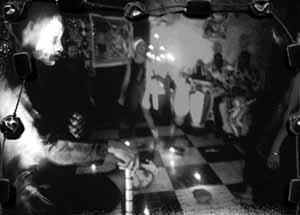Posted August 5, 2002
| AFTER THE DANCE: A WALK THROUGH CARNIVAL IN JACMEL |
| Amid the demons, dances of Haiti's vibrant Carnival |
The crossroads at which the spirit world intersects the Earth is a significant image in
Vodou. How regrettable yet predictable, then, to learn, in Edwidge Danticat's travel
memoir, that Haiti's annual Carnival parade assembles where Rue Comédie crosses Avenue de
la Liberté, in Jacmel, a faded coffee port on the southern peninsula. An arduous 45 miles
southeast of Port-au-Prince, the city is dominated by New Orleans-style mansions built by
19th century coffee merchants. A recent attempt to attract tourists has inspired the
refurbishing of several of the gingerbread buildings into boutiques and cafes.
| Haitian-born Danticat, novelist and editor, had never been to
a Carnival until the 2001 version she describes. Before she left Haiti at 12 to reunite
with her parents in New York, she was cared for by her uncle, a Baptist minister. In that
mix of protectiveness and malice that is the near-universal authority-figure style, he
deliberately frightened her, telling stories of deafening noise, demon possession and
frottage.
Danticat arrives in Jacmel burdened by that memory as well
as the ex-pat's conflicted and, unfortunately for the narrative, a dutiful student's
anthology of quotations and learned references, which she wears like a Carnival mask. When
she finds a church with an upward-pointing arrow atop the steeple, she quotes art
historian Robert Farris Thompson on |
|
| arrows. "a sign of war, token of aggression and manful
self-assertion" before her own observation that in the high pine forest an arrow is
also "a poignant remainder that in this part of the country, at least, heaven is the
next highest place." She spends a week in and about Jacmel, talking to the parade
organizer, wandering amid the brilliant pines and cacti and in the silent storied
cemeteries, subtly telling us some things we know about Haiti. The country induces
compassion fatigue in anyone who was born there, has lived there or visited, and it sets
us thinking more and more generally about the word Diaspora. |
Danticat also tells us some things we probably don't know: After a failed coup in the
1960s, Francois Duvalier set fire to the forests in the north so potential invaders would
have nowhere to hide. Finally, it's Carnival time. The pre-Lenten celebration anywhere is
an explosive mix of finery and animosity, nowhere more so than in Haiti, where misty
reality and arbitrary rules run as deeply as poverty in the structure of everyday life.
Finally, a reluctant Danticat drops her scholar facade and gets with the program.
Hard to resist a band calling itself Max Power and wearing masks of Mother Theresa,
Papa Doc, Einstein, Bob Marley and Hitler. Or one of its competitors, the group Relax Band
with its matching orange shirts. Bodies coated with motor oil, fantastic beasts dart in
and out of the crowds. Devils and bats flutter and swoop. Musicians on truck beds with
portable generators play until the power goes out; then a recording of Elton John singing,
''I believe in love. It's all we've got,'' can be heard from a cafe loudspeaker. A dozen
young women sign up for the fair queen contest, but only five show up, vying for airline
tickets to Cap Haitien and the Dominican Republic, a 12-inch TV, the equivalent of $350
U.S., a pair of cellphones, the chance to view the parade from the VIP stand, a photo on a
website.
Merchants who think Jacmel is Haiti's best shot at earning tourist cash have been
planning Carnival all year. Local and national musicians see it as the chance to audition
and compete. But most of the people, ''in a country that is not supposed to have any
joy,'' see it as the communal celebration it is, the fleeting crossroads of comedy and
liberty.
And Danticat, who brings a lingering apprehension along on this, one of her many trips
back, finally becomes part of the pageant, ''unencumbered, so lively, so free.'' Her book
is among the first in a series the publisher plans in which writers return to familiar
territory. It sets the bar high, for ultimately it is a novella within a travel memoir.
''After the dance,'' the proverb goes, ''the drum is heavy.'' In Carnival, all the rules
are reversed, and so, for this author, the proverb's opposite was true.
Betsy Willeford is a writer in Miami.
| Wehaitians.com, the scholarly journal of
democracy and human rights |
